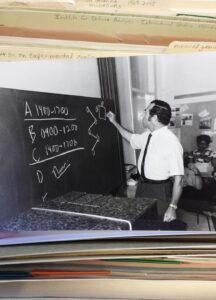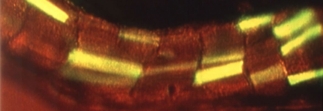
Dr. Bloomfield at the International Peace Academy, Vienna, August 1970. Lincoln P. Bloomfield Papers, MC 326, box 12. Massachusetts Institute of Technology, Institute Archives and Special Collections, Cambridge, Massachusetts.
For those interested in political science and international studies of the mid- to late-20th century — especially issues of arms control, disarmament, and political-military gaming — the Lincoln Bloomfield papers are a great resource!
A recently updated finding aid to the Bloomfield papers is now available on the MIT Institute Archives and Special Collections (IASC) website. The Guide to the Papers of Lincoln P. Bloomfield (MC326) is open for all to peruse and learn about the collection.
When a substantial amount of new materials were donated for the existing personal archive of the late political scientist Lincoln Bloomfield, several collections staff in the IASC had the chance to work with the collection to integrate the new and old. It was fun to see what the papers revealed and to revisit some of the major issues of the second half of the 20th century – the U.N., arms control, national security, peace-keeping, and “political gaming.”
The collection is divided into ten groups of materials, or series, including Correspondence, United Nations, Speeches and Notes, and Political Gaming. It is within the Political Gaming series that I learned about CASCON (Computer-Aided System for Analyzing Conflict), a computerized conflict analysis system designed to compare vast amounts of data about conflicts. The system can analyze historical conflicts against six phases and 571 identified factors. The data can then be used to predict phases and outcomes of an ongoing or new conflict.
In the collection there are multiple folders about CASCON and its development. These folders contain correspondence, hand-drawn charts, and conference documents that provide evidence of the development of CASCON from a program located on a large mainframe computer at MIT, to a system easily shared on disks. Because CASCON started in the early 1970s, the documents in the collection show how access and use of the system changed over time, as well as how the system was being used in the world of global politics.
To explore the Lincoln P. Bloomfield papers (MC326) further, please contact the IASC at mithistory@mit.edu or 617-253-5690.
